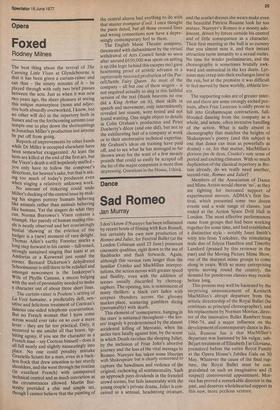Opera
Foxed
Rodney Milnes
The best thing about the revival of The Cunning Little Vixen at Glyndeboume is that it has been given a curtain-raiser and can thus — the ninety minutes of it — be played through with only two brief pauses between the acts. Just as when it was new two years ago, the sheer pleasure at seeing this unique masterpiece (noun and adjective both absurdly overworked, I know, but no other will do) in the repertory both in Sussex and on the forthcoming autumn tour tempts one to play down the shortcomings in Jonathan Miller's production lest anyone be put off from going.
Reports of improvements by other hands while Dr Miller is occupied elsewhere have been somewhat exaggerated. At least the hens are killed at the end of the first act, but the Vixen's death is still hopelessly muffed — you only have to follow the composer's directions, for heaven's sake, but that is asking too much of today's producers even When staging a relatively unknown work.
No amount of tinkering could undo Miller's ducking of the central issue by making his singers pgrtray humans behaving like animals rather than animals behaving like humans. Yet the singers do what they can. Norma Burrowes's Vixen remains a triumph. Her parody of human mating.rituals is neatly observed and her convincingly bestial 'showing' at the eviction of the badger is a (new) moment of rare delight. Thomas Allen's earthy Forester marks a long step forward in his career — full-toned, strongly sustained singing that hints at an Amfortas or a Kurwenal just round the corner. Bernard Dickerson's dehydrated Schoolmaster is still there to be relished and amongst newcomers is the Innkeeper's Wife of Phyllis Cannan, a mezzo bulging With the sort of personality needed to make a character out of about three short lines.
The curtain-raiser is Paulenc's setting of La Voix humaine, a predictably deft, sen-. wive and felicitous treatment of Cocteau's famous one-sided telephone conversation. But no French woman that I have come across would ever take on so over a mere lover — they are far too practical. Only, it occurred to me amidst all that brave, hpbiting agony, if you see the character as a French man — say Cocteau himself does it all fall neatly and slightly nauseatingly into Place. No one could possibly mistake Graziella Sciutti for a man, even in a backless frock that drew attention to her sturdy Shoulders, and she went through the routine (111 excellent French) with unimpaired technical control and as much conviction as the circumstances allowed. Martin Battersby provided a chic and simple set, though I cannot believe that the painting of the central alcove had anything to do with that master trompeur d'oeil. I once thought the piece dated, but all those crossed lines and wrong connections now have a depressingly contemporary feel to them. The English Music Theatre company, threatened with disbandment by the virtual withdrawal of Arts Council funds so soon after around £650,000 was spent on setting it up (the logic behind this escapes me) gave heartening proof of artistic advance in a rapturously received production of the Purcell/Settle Fairy Queen. As most of the company — all but one of them singers — is not required actually to sing in this faithful version of the text (thank heavens no one did a King Arthur on it), their skills in speech and movement, only intermittently revealed last season, were tested and not found wanting. One might object to details in Colin Graham's production and Peter Docherty's decor (and one did), but not to the exhilarating feel of a company at work or to their unobtrusive technical expertise. Mr Graham's ideas on training have paid off, and to see what he has managed so far thrown away. for the want of a few measly pounds that could so easily be scraped off the fat of the major companies is more than depressing. Questions in the House, I think.


































 Previous page
Previous page